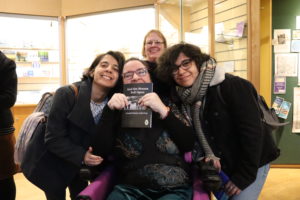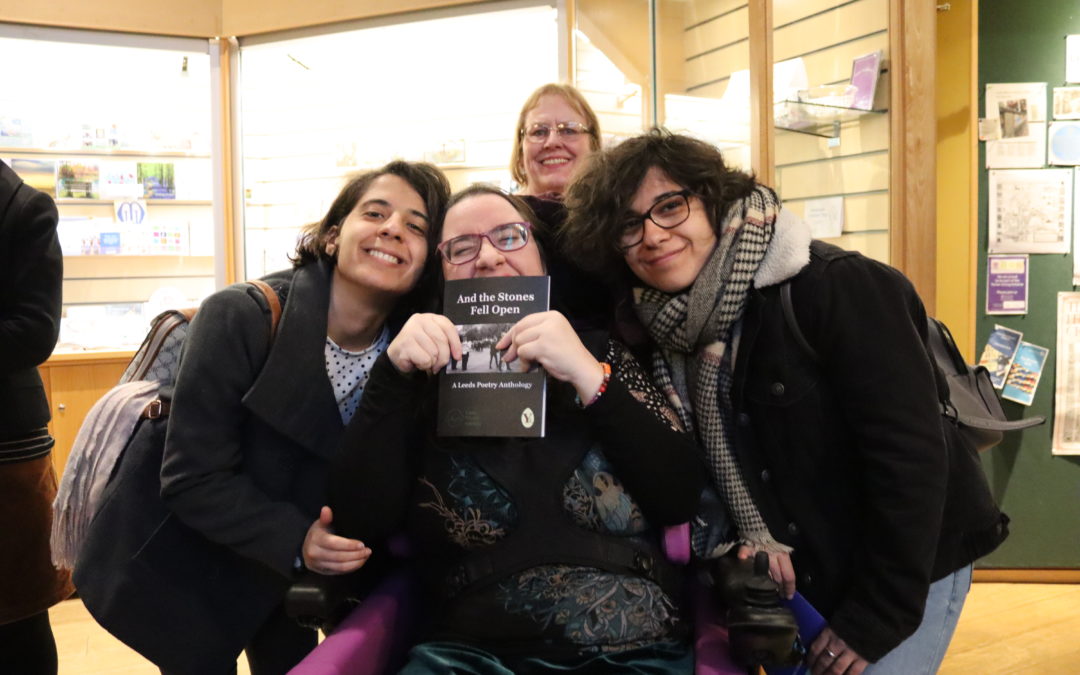This is the first in our series shining a spotlight on the poets of Leeds who contributed to ‘And the Stones Fell Open: A Leeds Poetry Anthology’.

Rachel with Guilia and Roberta, and her Mum
About Rachel
LCI Director Dr Helen Reid spoke to Rachel Flint, a poet and lifelong resident of Leeds who lives in a supported living scheme in Seacroft. Rachel has no set schedule for writing but believes poetry is a good way to de-clutter the mind and get her thoughts down on paper. Rachel’s poems were runner up in the Leeds Peace Poetry competition in 2013 and her poem “Shade Battalion” was shortlisted in 2015.
Treasure
For Guilia and Roberta
There is no room for nervousness
When meeting your support worker.
They see your nakedness
The bed hair, dirty underwear, duvet days.
Unfiltered life.
The part that’s usually behind closed doors.
Kindness is gold, dignity sacred.
My treasure is found in gentle Sicilian voices
‘Morning carina, how did you sleep?’
Instant sunlight enters the room
Makes it home, makes it human.
Leeds has welcomed them,
Given them opportunities, love and acceptance.
Though they long for loquats,
They wouldn’t be anywhere else.
Only when the Bre*it word is mentioned
Does a cloud cross their faces.
Published in ‘And the Stones Fell Open: A Leeds Poetry Anthology’ It is our hope that we can share more of Rachel’s poems soon.
How did you get into poetry? How central is it to your life?
I wrote my first poem at the age of 7 in 1995, it was for my Grandad. I don’t remember exactly what it said, but it was written for him and it was the beginning of something important for me. I also have childhood memories of my Mum reading me poems, including Daffodils by Wordsworth and the Star Crossed Lovers set during the Jacobite Rebellion.
Writing poetry is the only thing I have ever wanted to do. I entered competitions at school and was greatly encouraged in sharing my poetry when at college. When I was 17, I spent two years at Hereward College in Coventry, a further education college where I studied creative writing, journalism and TV/video production. Conductive education (as pioneered at the Peto Institute) was part of the PE programme. It was a formative time for me and, at an Open Mike night there, was my first experience of live performance poetry.
My poetry is a form of journaling and my poems record and tell the story of my life. I don’t mean it to be my story in an egotistical way, but it expresses my reality. For example, my poem The Glass Tank which I collaborated with my mum to write, is about my early years.
The whole experience of living away from home and all that I learnt there, made it possible for me to set up my own home, aged 28, here in Leeds. I wouldn’t have managed to do that without having been to college.
During this period of lockdown, I am focussing on what makes me feel grateful. I am grateful for my own home and a carer who makes it possible for me to live here; my Mum comes for two hours each day so that my carer can have down time. I am on a ground floor and can go outside to a garden where there are wildflowers and butterflies. These things help me through the challenges of the covid crisis.
How long have you lived in Leeds – what is your perspective on the city?
I have lived in Leeds all my life, except the two years at college in Coventry. I like Leeds for being a modern and inclusive city; that there are lovely gardens and parks; for the cultural life, including the museums.
Sadly I have experienced abuse when out and about in Leeds. Quite recently when I was in the city centre, a man driving past wound down his window and called out abusively. I felt shocked and thought ‘Why?’ – did he think I didn’t know I have cerebral palsy? Did it make him feel better about himself for some unfathomable reason? I have thought about reporting the abuse, but what will be done – will it get anywhere?
I don’t imagine living anywhere else. My family networks are what anchor me to Leeds.
How did you hear about the poetry anthology?
The Yorkshire Evening Post (LCI is grateful to the YEP for the publicity and putting us in contact with Rachel and her poetry).
I have read your poems on Poemhunter. On reading them, I can see that humour is important to your poetry. Can you tell me about the importance of humour?
Humour punctures, but it doesn’t wound. Humour can take the mickey out of people with inflated egos and privilege. It is in the DNA of most people and is our common language. In poetry, I seek to make a difference, to say what matters, and humour can be a gentle but effective way to do that.
The poem Treasure published in the anthology And The Stones Fell is quite a different poem to those on Poemhunter which were written about 10 years ago; it seems to be to be more joy than humour. It is very personal and it is a gift – full of empathy and compassion, as well as self awareness. Can you tell me about writing the poem?
The poem is a realistic portrait of two people, my carers Guilia and Roberta who are two very kind people from Sicily. Roberta came to the UK first, and Guilia came a year later because she missed her sister. They are lovely, warm people; tactile, sweet and kind natured. It upset me to see that when the word Brexit came up, they were worried and feared being kicked out of the country. It broke my heart because carers are seen as low skilled and not valued. How can we justify seeing carers like this? The covid crisis has highlighted the importance of carers and how skilled they are in their role. It is about time this was recognised.
Roberta translated the poem into Italian and we sent it to her mother. I have had messages from her mother and aunties about the poem which is lovely.
Have you written any poems since Treasure?
Quite recently I wrote one about the royal family, but since then, time has moved on. The covid crisis has started and it doesn’t seem as relevant. I have written a poem for my friend Gareth Thompson who works for Christians Against Poverty. I think he and his work are an inspiration because it is about challenging poverty and especially poverty that comes about through debt. Working to cancel debt seems an act of faith for Christians because forgiveness is so central to the faith.


Wow! You are such an inspiration! Never letting life get you down, always looking for the beauty in the world!
God bless you Rachel.
I am proud to call you a freind and keep bringing your light into the world.